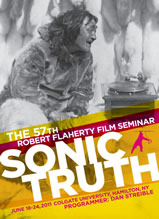Attending the Robert Flaherty Film Seminar means being open to a different kind of film festival. Don’t, for example, ask for a list of films to be screened, because you won’t get one. Do, however, be open to in-depth discussion, and lots of it.
Last week, for the fourth consecutive year, the Flaherty Seminar was held at şÚÁĎÍř, an arrangement that has proved very successful for both parties.
“In addition to şÚÁĎÍř having dual 35-millimeter projectors — which is one of the hardest things to find on a college campus — and enough seats in a theater, it’s also great to be in upstate New York,” said Mary Kerr, executive director of the Flaherty. “We have people from all over the country and the world attending, and we’re excited to be able to expose them to this kind of setting.”
 The theme of this year’s seminar, curated by Dan Streible, was Sonic Truth. It focused on the audio and musical dimensions of filmmaking.
The theme of this year’s seminar, curated by Dan Streible, was Sonic Truth. It focused on the audio and musical dimensions of filmmaking.
“It just kept coming back to audio, music, and place, and how music is a part of every culture and how it can really define a place,” said Kerr. “Dan wanted to concentrate on not just sounds for technical filmmaking, but also on the sound of the atmosphere that surrounds you.”
The sounds of excited chatter filled Golden Auditorium last Tuesday, before the 2 p.m. screening, as attendees waited to discover what films were on tap.
The screening turned out to be a mix of 16mm films by Lillian Schwartz and Jodie Mack. Schwartz is considered a pioneer in the world of computer art, and she is credited with one of the first digitally created films. Mack, inspired by Schwartz’s work, currently teaches animation at Dartmouth College and is known for her artistic depiction of tactile objects such as fabrics, objects, and cutout materials, as well as celluloid.
During the session, 3D glasses were passed out for the participants to watch Schwartz’s films ±«ąó°żâ€™s (1971) and Galaxies (1974).
All filmmakers invited to present at the seminar stay the entire week, creating the opportunity for an evolving discussion with participants.
“I really like the mix of people — that it’s not all filmmakers and not all film scholars, but also anthropologists, museum curators, and more,” said Augusta Palmer, a filmmaker and scholar from Brooklyn, N.Y. “It’s really a varied group, which is nice for someone like me who does a couple of different things.”
şÚÁĎÍř President Jeffrey Herbst and Flaherty board members met to discuss ways to further develop the relationship between the seminar and university, integrating the expertise offered by festival participants with that of faculty members. One opportunity might be to utilize the university’s visualization lab in the Ho Science Center, which Flaherty board members toured last week.
“This is such a significant relationship for both the Flaherty and the university,” said Professor John Knecht who, along with Professor Lynn Schwarzer, works closely with seminar organizers. “It is really exciting to have President Herbst involved in this dialogue about ways we might deepen our interactions.”